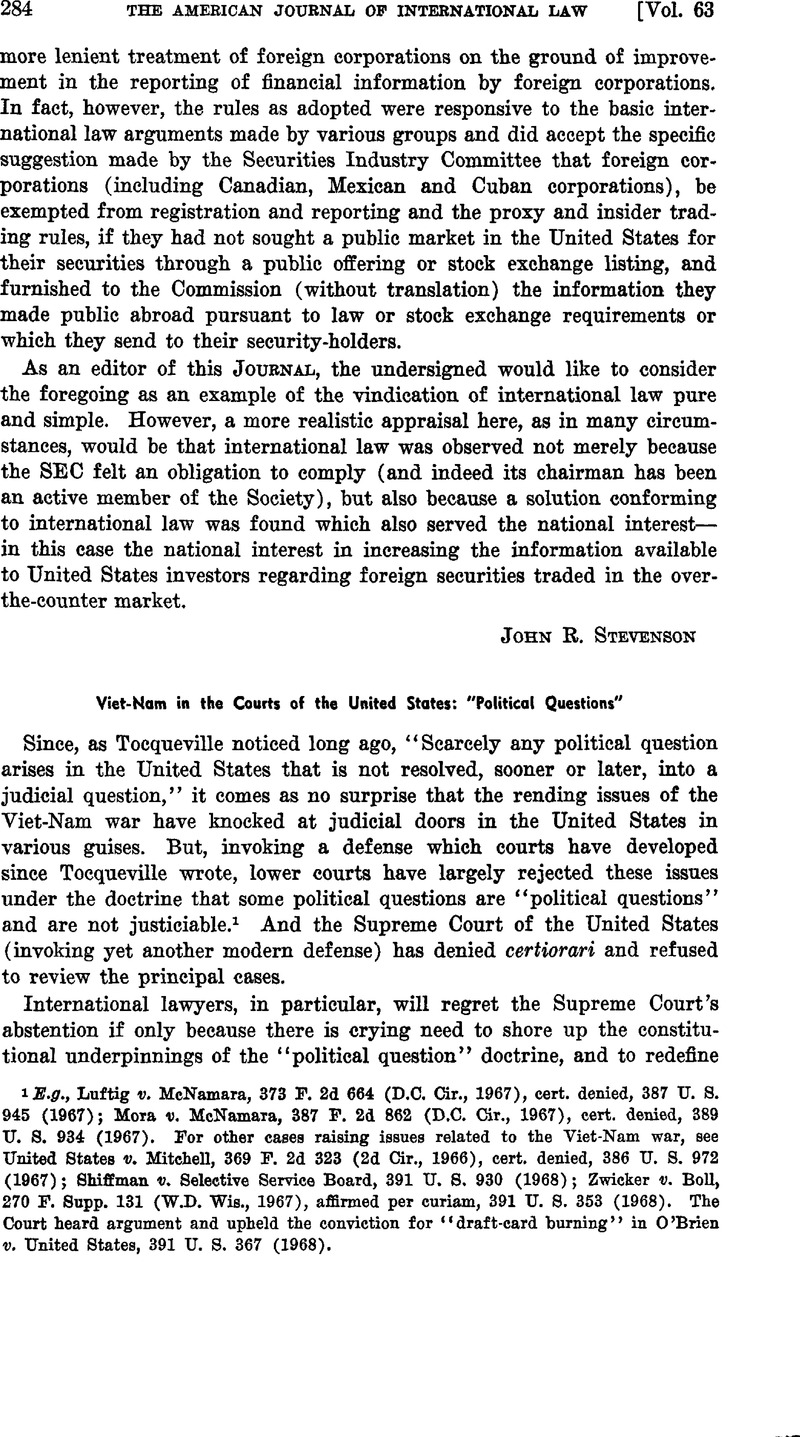No CrossRef data available.
Article contents
Viet-Nam in the Courts of the United States: “Political Questions”
Published online by Cambridge University Press: 28 March 2017
Abstract

- Type
- Editorial Comment
- Information
- Copyright
- Copyright © The American Society of International Law 1969
References
1 E.g., Luftig v. McNamara, 373 F. 2d 664 (D.C. Cir., 1967), cert, denied, 387 TJ. 8. 945 (1967); Mora v. McNamara, 387 F. 2d 862 (D.C. Cir., 1967), cert, denied, 389 U. S. 934 (1967). For other cases raising issues related to the Viet-Nam war, see United States v. Mitchell, 369 F. 2d 323 (2d Cir., 1966), cert, denied, 386 U. 8. 972 (1967); Shiftman v. Selective Service Board, 391 U. 8. 930 (1968); Zwicker v. Boll, 270 F. Supp. 131 (W.D. Wis., 1967), affirmed per curiam, 391 U. 8. 353 (1968). The Court heard argument and upheld the conviction for “draft-card burning” in O'Brien v. United States, 391 U. 8. 367 (1968).
2 369 U. 8. 186 (1962).
3 Luther v. Borden, 7 How. 1 (TJ. S., 1849).
4 Clearly the Court would not review impeachment proceedings on a simple writ of error. I doubt that the Court would consider even claims that a particular impeachment proceeding denied due process. In the latter case, of course, the Court would be abstaining on a basis closer to a pure political question. Compare note 12 below
5 Foster & Elam v. Neilson, 2 Peters 253 (U. S., 1829); Williams v. Suffolk Insurance Co., 13 Peters 415 (TJ. S., 1839); Jones v. United States, 137 U. S. 202 (1890). Most of the eases noted here, and others, are discussed in a fine article by Professor Edwin Dickinson, “The Law of Nations as National Law: ‘Political Questions,’ “ 104 TJ. Pa. Law Rev. 451 (1956), but he makes of them something more and somewhat different.
6 Rose v. Homely, 4 Cranch 241 (U. S., 1808); Gelston v. Hoyt, 3 Wheat. 246 (U. S., 1818); Guaranty Trust Co. v. United States, 304 U. S. 126 (1938).
7 Charlton v. Kelly, 229 U. S. 447 (1913).
8 Whitney v. Eobertson, 124 TJ. 8. 190 (1888); Chinese Exclusion Case, 130 U. 8. 581 (1889).
9 Compare Ex parte Muir, 254 IT. S. 522 (1921).
10 Ex parte Peru, 318 TJ. 8. 578 (1943); Eepublic of Mexico v. Hoffman, 324 U. 8. 30 (1945).
11 Compare Banco National de Cuba v. Sabbatino, 376 TJ. 8. 398 (1964); Bernstein v. Van Heyghen Freres, 163 P. 2d 246 (2d Cir., 1947), cert, denied, 332 TJ. 8. 772 (1947), 210 P. 2d 375 (2d Cir., 1954); the Second Hickenlooper Amendment, 79 Stat. 653, 659, 22 U.S.C. §2370(e)(2) (Supp. I, 1965).
12 The Court was not saying anything different in cases like Chicago and Southern Air Lines v. Waterman S.S. Corp., 333 TJ. 8. 103, 112-114 (1948): “ B u t even if courts could require full disclosure, the very nature of executive decisions as to foreign policy is political, not judicial. Such decisions are wholly confided by our Constitution to the political departments of the government, Executive and Legislative. They are delicate, complex, and involve large elements of prophecy. They are and should be undertaken only by those directly responsible to the people whose welfare they advance or peril. They are decisions of a kind for which the Judiciary has neither aptitude, facilities nor responsibility and which has long been held to belong in the domain of political power not subject to judicial intrusion or inquiry.” See also United States v. Curtiss- Wright Export Corp., 299 TJ. S. 304, 319-321 (1936). In that case, the Court held that an action by the President pursuant to delegation by Congress was amply within their powers; it did not say that the constitutional validity of the action could not be examined.
13 Youngstown Sheet & Tube Co. v. Sawyer, 343 U. S. 579 (1952).
14 Wechsler, “Toward Neutral Principles of Constitutional Law,” 73 Harv. Law Eev. 1, 9 (1959).
15 Bickel, “The Supreme Court, 1960 Term—Foreword: The Passive Virtues,” 75 Harv. Law Eev. 40, 46 (1961). Later (at p. 75) he says: “Such is the basis of the political question doctrine: the court's sense of lack of capacity, compounded in unequal parts of the strangeness of the issue and the suspicion that it will have to yield more often and more substantially to expediency than to principle; the sheer momentousness of it, which unbalances judgment and prevents one from subsuming the normal calculations of probabilities; the anxiety not so much that judicial judgment will be ignored, as that perhaps it should be, but won't; finally and in sum (“in a mature democracy“) the inner vulnerability of an institution which is electorally irresponsible and has no earth to draw strength from.“
16 See his dissent in Baker v. Carr, 369 TJ. S. 186, 266, 267 (1962). Compare his opinion in Colegroye v. Green, 328 U. S. 549 (1946).
17 It may even be that Viet-Nam can be readily transformed into my second, easy kind of political question by holding there is no issue of usurpation by the President, no conflict with Congress of any constitutional dimension, because Congress effectively authorized, ratified or acquiesced in what the President has done.




